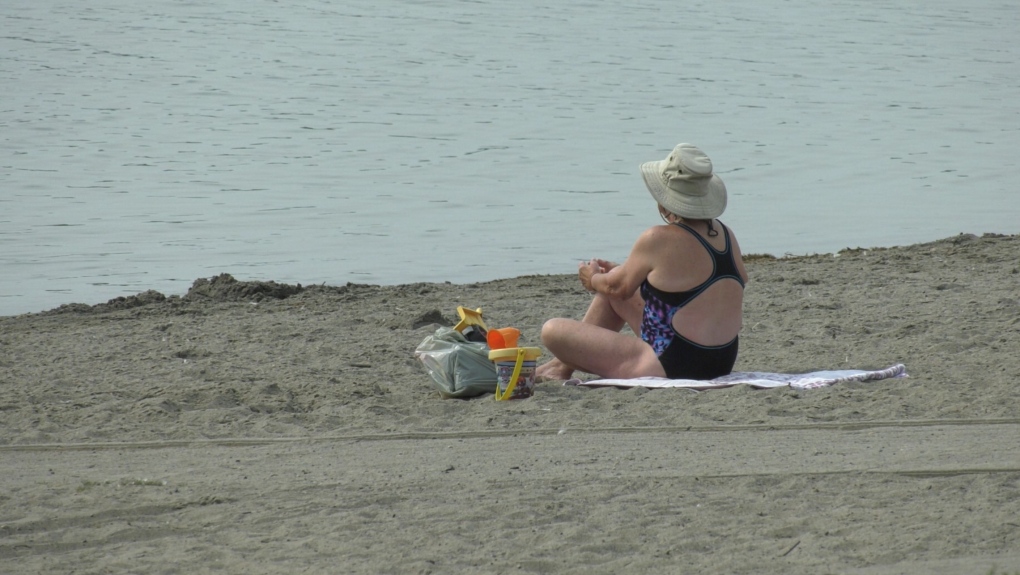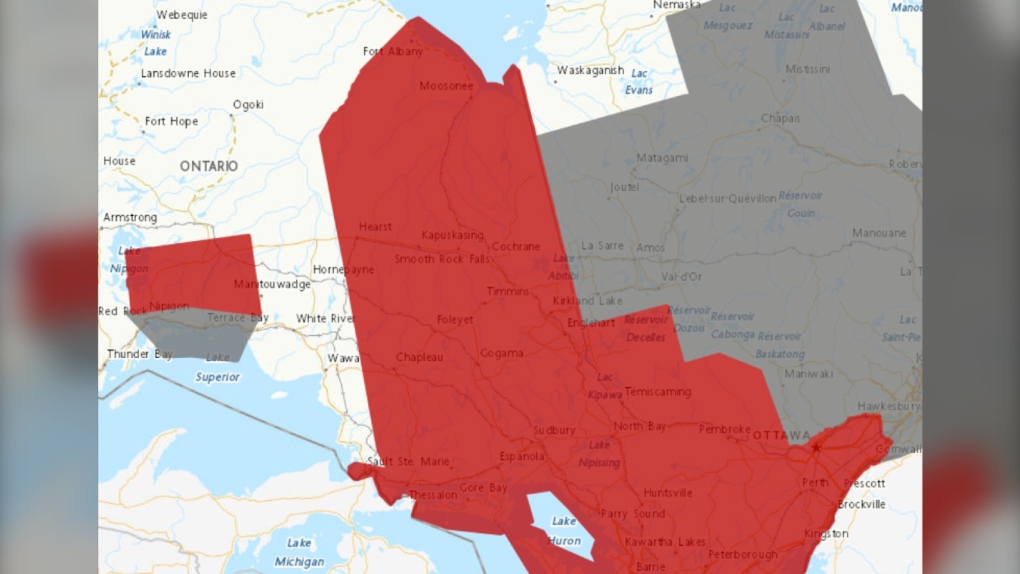Heat warnings issued in northeastern Ont.
With above seasonal temperatures expected this week, Environment and Climate Change Canada (ECCC) has issued a heat warning within Public Health Sudbury & Districts’ (PHSD) service area beginning Monday, public health officials said in a news release Sunday afternoon.
 As a heatwave moves through many communities across the northeast, Public Health Sudbury and Districts has issued some to tips on how to look out for and prevent the signs and symptoms of heat-related illness. A woman on a Greater Sudbury beach near the water on Aug. 19, 2021 (File photo/Lyndsay Aelick/CTV News Northern Ontario)
As a heatwave moves through many communities across the northeast, Public Health Sudbury and Districts has issued some to tips on how to look out for and prevent the signs and symptoms of heat-related illness. A woman on a Greater Sudbury beach near the water on Aug. 19, 2021 (File photo/Lyndsay Aelick/CTV News Northern Ontario)
With hot, humid weather in the forecast, Greater Sudbury and vicinity and all of Manitoulin Island along with communities of Chapleau, Espanola, Foleyet, French River, Gogama, Killarney, Markstay-Warren, Massey, Missinaibi Lake, St. Charles and West-Nipissing are under a heat warning from the health unit.
The ECCC has also issued heat warnings for North Bay, Sault Ste. Marie, Superior East, Timmins and Cochrane along with several of their neighboring communities.
Environment Canada heat warnings
Heat warnings are issued by ECCC when the forecasted temperature for two consecutive days is 29 C or more during the day and 18 C or above at night or the forecasted humidex is 36 C or higher.
Daytime highs on Monday through Wednesday are expected to be 28 C to 33 C with humidex values between 36 C and 42 C with little relief overnight as lows are expected to be 18 C to 22 C with humidex values of 25 C to 30 C, said ECCC officials in the warning. Temperatures are expected to peak on Tuesday, according to Environment Canada’s forecast.
 Weather alert map for northern Ontario (Red - warnings, Grey - special weather statements) as of 10 p.m. on June 16, 2024. (Environment and Climate Change Canada)
Weather alert map for northern Ontario (Red - warnings, Grey - special weather statements) as of 10 p.m. on June 16, 2024. (Environment and Climate Change Canada)
Taking precations, staying cool
“Although some individuals are at higher risk, anyone can suffer from heat-related illnesses,” said Burgess Hawkins, a health protection division manager with PHSD, in a news release.
“Everyone should take precautions.”
PHSD officials cautioned that prolonged exposure to high levels of heat can lead to dehydration and illnesses such as heat stroke, heat exhaustion, heat fainting, heat rash, muscle cramps, swelling of hands, feet and ankles, called heat edema, and even death.
“People who are most at risk include, older adults, infants and young children, pregnant women, people with chronic illnesses, people who are homeless, people who use alcohol or illicit drugs and those who work or exercise in the heat,” reads the PHSD news release.
“Those who take medications or have a health condition should consult their doctor or pharmacist to determine if they are at increased risk from the heat and follow their recommendations.”
The health authority provided the following tips to prevent heat-related illness:
- Drink plenty of cool liquids, especially water, before you feel thirsty to decrease your risk of dehydration. Thirst is not a good indicator of dehydration.
- Reschedule or plan outdoor activities during cooler parts of the day.
- Wear loose-fitting, light-coloured clothing made of breathable fabric.
- Never leave people or pets in your care inside a parked vehicle or in direct sunlight – even if the windows are down.
- Take a break from the heat by spending a few hours in a cool place.
- Take a cool bath or shower periodically, or cool down with cool, wet towels.
- Prepare meals that do not need to be cooked in your oven.
- Block out the sun by closing awnings, curtains, or blinds during the day.
- Avoid sun exposure. Shade yourself by wearing a wide-brimmed, breathable hat, or using an umbrella.
- Frequently visit or check in on neighbours, friends, and older family members, especially those who are chronically ill, to make sure that they are cool and hydrated.
- Babies under 6 months of age do not need extra water in hot weather; however, you might need to feed them more often. Follow your baby’s feeding cues. Encourage babies over 6 months and children to drink frequently. Offer the breast or if not breastfeeding, offer water.
Know the signs of heat-related illness
PHSD also provided a listing of symptoms of heat-related illnesses – they include dizziness or fainting, nausea or vomiting, headache, rapid breathing and heartbeat, extreme thirst and decreased urination with unusually dark yellow urine.
“If you or someone in your care experiences these symptoms, contact a health care professional,” said public health officials.
“(And) in emergencies call 911.”
PHSD also offers information on beating the heat in apartment buildings, keeping your pets safe, doing outdoor activities in heat and smog and on how to keep your children safe during hot weather on its website.
CTVNews.ca Top Stories

Richard Perry, record producer behind 'You're So Vain' and other hits, dies at 82
Richard Perry, a hitmaking record producer with a flair for both standards and contemporary sounds whose many successes included Carly Simon’s 'You’re So Vain,' Rod Stewart’s 'The Great American Songbook' series and a Ringo Starr album featuring all four Beatles, died Tuesday. He was 82.
Hong Kong police issue arrest warrants and bounties for six activists including two Canadians
Hong Kong police on Tuesday announced a fresh round of arrest warrants for six activists based overseas, with bounties set at $1 million Hong Kong dollars for information leading to their arrests.
Read Trudeau's Christmas message
Prime Minister Justin Trudeau issued his Christmas message on Tuesday. Here is his message in full.
Stunning photos show lava erupting from Hawaii's Kilauea volcano
One of the world's most active volcanoes spewed lava into the air for a second straight day on Tuesday.
Indigenous family faced discrimination in North Bay, Ont., when they were kicked off transit bus
Ontario's Human Rights Tribunal has awarded members of an Indigenous family in North Bay $15,000 each after it ruled they were victims of discrimination.
What is flagpoling? A new ban on the practice is starting to take effect
Immigration measures announced as part of Canada's border response to president-elect Donald Trump's 25 per cent tariff threat are starting to be implemented, beginning with a ban on what's known as 'flagpoling.'
Dismiss Trump taunts, expert says after 'churlish' social media posts about Canada
U.S. president-elect Donald Trump and those in his corner continue to send out strong messages about Canada.
Heavy travel day starts with brief grounding of all American Airlines flights
American Airlines briefly grounded flights nationwide Tuesday because of a technical problem just as the Christmas travel season kicked into overdrive and winter weather threatened more potential problems for those planning to fly or drive.
King Charles III is set to focus on healthcare workers in his traditional Christmas message
King Charles III is expected to use his annual Christmas message to highlight health workers, at the end of a year in which both he and the Princess of Wales were diagnosed with cancer.

































